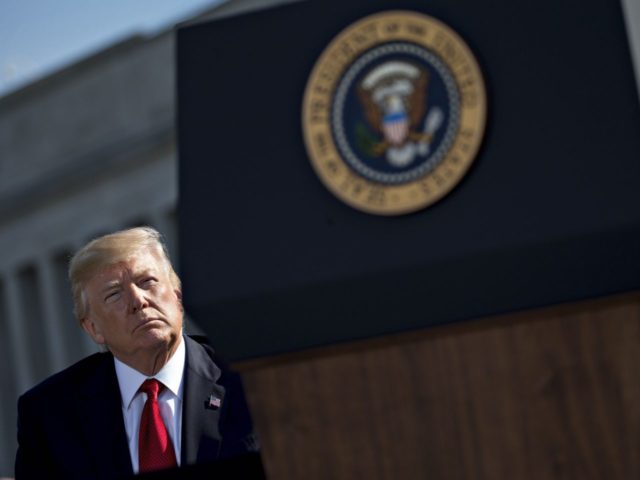President Donald Trump and several members of his Cabinet gave moving addresses to commemorate the 16th anniversary of the 9/11 attacks. But they each neglected to name the enemy, radical Islam, falling back into a practice adopted by the previous administration, one that Trump had mocked relentlessly on the campaign trail.
Their rhetorical delicacy suggests a continuing confusion about what victory in the war on terror would look like.
President George W. Bush insisted that the U.S. was not at war with Islam itself, which he called a “religion of peace.” Much of the Islamic world refused to see it that way.
So the Obama administration took Bush’s approach even further. He attempted to appease Islamic public opinion by acknowledging America’s perceived misdeeds, by drawing moral equivalences with Christian atrocities, and eliminating references to radical Islamic terror entirely.
Where Bush hoped to avoid a broader confrontation with Muslims beyond those countries actually sheltering Al Qaeda, Obama, more ambitiously, hoped to resolve Islam’s grievances against the West by acknowledging them.
Neither strategy worked, because the pathology of radical Islamic terror is a response to the social dysfunction of the Islamic world, and draws upon theological concepts of martyrdom that are deeply rooted in the Islamic faith.
As such, it is almost impossible to imagine that terror can be completely eliminated. Palestinian terrorists are a prime example. When the Israeli “wall” blocked their suicide bombers, and the Iron Dome shot down their rockets, they turned to automobiles, knives, and even household scissors to carry out their jihad. The so-called Islamic State terrorists have done the same over the past year in Europe, using cars, vans, and trucks to carry out mass murder.
Radical Islamic terror will survive as long as the ideas that fuel it. In past conflicts, bad ideas could be discouraged by showing that they led to utter, catastrophic defeat. That is how Nazism and Japanese imperialism were destroyed in the Second World War: by firebombing, nuclear bombs, and unconditional surrender.
Defeating a terrorist state like Iran would help, but would not solve the problem. Many Islamic radicals would cheer the fall of Arab regimes.
An Israeli leader once said, during a more optimistic era in the Middle East, that small acts of terrorism could not be allowed to derail the peace process — that they could not allow every madman with a gun to exercise a veto. So, too, with the war on terror: if victory is defined as the complete end to terror, then we can never actually win.
The left deals with that by telling us we must accept terror as a fact of life; the right promises a victory we cannot achieve.
The fact that Trump and his Cabinet dropped “radical Islamic terror” on their first 9/11 is a tacit admission that they do not know exactly how to complete the victory that the public demands, and has been told to expect. True, unlike Obama, they do not apologize for America. But like Obama and like Bush, they hope the Islamic world will help at some point. Yet there is only so much that even moderate Muslims, and the few regimes that support them, can do.
What is within our own power to achieve is a defense of the ideas and values at the core of our civilization. And we can defend societies that share them. We can, tomorrow, move the U.S. embassy in Israel to Jerusalem, for example, fulfilling in deed our commitment in principle to Israel’s sovereignty. We can help the pro-democracy forces in Iran.
We can do these things and more, and we should not fear to name the enemy. It will persist. Therefore, so must we.
Joel B. Pollak is Senior Editor-at-Large at Breitbart News. He was named one of the “most influential” people in news media in 2016. He is the co-author of How Trump Won: The Inside Story of a Revolution, is available from Regnery. Follow him on Twitter at @joelpollak.

COMMENTS
Please let us know if you're having issues with commenting.